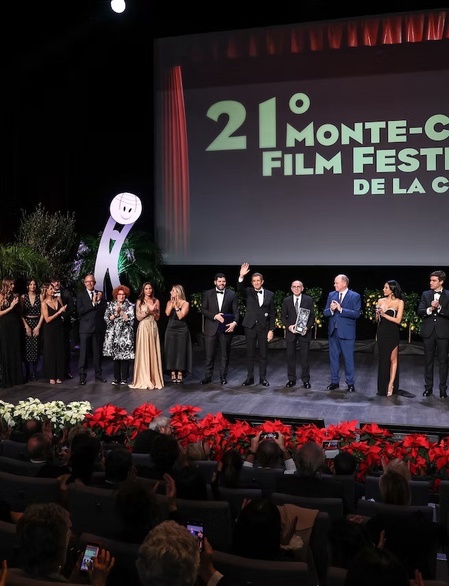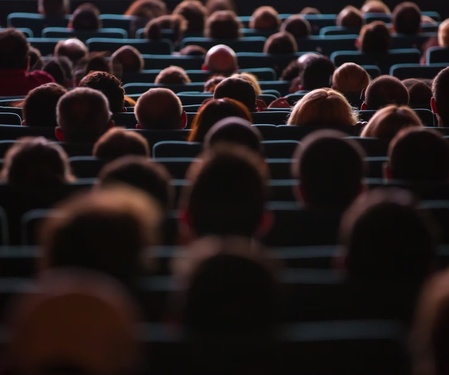
Monte-Carlo Film Festival 2024: A Line-Up that Ignites the World of Comedy Cinema. (c) Omar Galantino MCFF Media Relations MONACO Official website
"A day without laughter is a day wasted." (Charlie Chaplin)
Better late than never to celebrate the big winners of this edition! "La Casa en Flames" by Dani de la Orden left a lasting mark on the festival, winning not only the Best Film Award but also the Audience Jury Award. A triumph for this Spanish director who has been a faithful attendee of the festival, returning for the fourth consecutive year.
Matthew Rankin stood out by winning the Best Director Award for his Canadian film "Universal Language", while the title of Best Actor went to Marcelo Subiotto for the Argentine film "Puan". Finally, Marie Benati charmed the jury and took home the Best Actress Award for her role in the English film "Paul & Paulette Take a Bath".
A ceremony filled with elegance, laughter, and recognition of talent, which honored works where comedy transcends borders.
Better late than never to celebrate the big winners of this edition! "La Casa en Flames" by Dani de la Orden left a lasting mark on the festival, winning not only the Best Film Award but also the Audience Jury Award. A triumph for this Spanish director who has been a faithful attendee of the festival, returning for the fourth consecutive year.
Matthew Rankin stood out by winning the Best Director Award for his Canadian film "Universal Language", while the title of Best Actor went to Marcelo Subiotto for the Argentine film "Puan". Finally, Marie Benati charmed the jury and took home the Best Actress Award for her role in the English film "Paul & Paulette Take a Bath".
A ceremony filled with elegance, laughter, and recognition of talent, which honored works where comedy transcends borders.
The Monte-Carlo Film Festival: An Ode to Laughter for Two Decades
Founded in 2001 by Ezio Greggio, a renowned Italian actor and comedian, the Monte-Carlo Comedy Film Festival has established itself over the years as a key event in international comedy cinema. Dedicated to celebrating laughter in all its forms, this festival is the only one in the world focused exclusively on comedy. Under the High Patronage of H.S.H. Prince Albert II of Monaco, it attracts directors, actors, and movie lovers from all over the world.
With its mission to elevate comedy, often underestimated by major awards ceremonies, the festival has created a platform where comedic talent is taken seriously. Beyond laughter, it sheds light on societal issues through the lens of humor, offering subtle and sometimes biting reflections on the modern world.
With its mission to elevate comedy, often underestimated by major awards ceremonies, the festival has created a platform where comedic talent is taken seriously. Beyond laughter, it sheds light on societal issues through the lens of humor, offering subtle and sometimes biting reflections on the modern world.
Films that Blend Comedy and Reflection
This year’s winning films perfectly illustrate the diversity and richness of the comedy genre. "La Casa en Flames" by Dani de la Orden combines energetic direction and sharp dialogue to explore the complexities of human relationships with biting humor. De la Orden, known for his dynamic comedies, often draws inspiration from everyday life to create hilariously realistic situations.
Matthew Rankin, awarded for "Universal Language", offers an original vision of the genre. A Canadian director known for his experimental style and surreal influences, he uses comedy to explore cultural and linguistic gaps with an eccentric visual aesthetic. His film, mixing absurdity and social satire, demonstrates that humor can also be a playground for artistic experimentation.
In Argentina, Marcelo Subiotto shines in "Puan", a dramedy that examines the academic world with bittersweet irony. Subiotto, a seasoned stage and screen actor, excels at conveying complex emotions while maintaining a lightness characteristic of South American comedy.
Lastly, Marie Benati, honored for her role in "Paul & Paulette Take a Bath", embodies with finesse a modern heroine facing absurd yet revealing situations of contemporary life's small absurdities. The English film thrives on situational humor, a beloved style in British cinema where laughter often springs from the ordinary.
A Festival that Elevates Comedy
By honoring films with diverse styles, the Monte-Carlo Comedy Film Festival once again proves that comedy is more than mere entertainment. It is a window into society, capable of making us reflect while making us laugh. Behind every gag, a reality unfolds, and within each burst of laughter lies a kernel of truth.
The 21st edition of the festival may have concluded, but its legacy lives on: a reminder that laughter is an art form in its own right, and in an often serious world, comedy provides a necessary breath of lightness and intelligence.
Matthew Rankin, awarded for "Universal Language", offers an original vision of the genre. A Canadian director known for his experimental style and surreal influences, he uses comedy to explore cultural and linguistic gaps with an eccentric visual aesthetic. His film, mixing absurdity and social satire, demonstrates that humor can also be a playground for artistic experimentation.
In Argentina, Marcelo Subiotto shines in "Puan", a dramedy that examines the academic world with bittersweet irony. Subiotto, a seasoned stage and screen actor, excels at conveying complex emotions while maintaining a lightness characteristic of South American comedy.
Lastly, Marie Benati, honored for her role in "Paul & Paulette Take a Bath", embodies with finesse a modern heroine facing absurd yet revealing situations of contemporary life's small absurdities. The English film thrives on situational humor, a beloved style in British cinema where laughter often springs from the ordinary.
A Festival that Elevates Comedy
By honoring films with diverse styles, the Monte-Carlo Comedy Film Festival once again proves that comedy is more than mere entertainment. It is a window into society, capable of making us reflect while making us laugh. Behind every gag, a reality unfolds, and within each burst of laughter lies a kernel of truth.
The 21st edition of the festival may have concluded, but its legacy lives on: a reminder that laughter is an art form in its own right, and in an often serious world, comedy provides a necessary breath of lightness and intelligence.















 Trois grands festivals européens vont célébrer leur 80e anniversaire
Trois grands festivals européens vont célébrer leur 80e anniversaire








